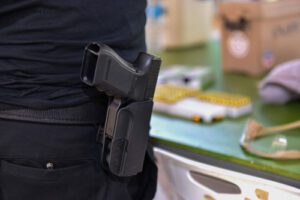 The District Court continued: Finally, as discussed above, see supra Section III.A, the Court finds that Plaintiffs’ credible fear of prosecution for violating one of the challenged restrictions constitutes irreparable injury. [See Koons Decl. ¶ 12; Gaudio Decl. ⁋ 15; Muller Decl. ¶ 13.] Unlike the Angelo v. District of Columbia court, which found under D.C. Circuit precedent that gun permit holders could not establish standing to challenge newly enacted legislation prohibiting them from carrying their handguns on public transportation because they could not point to prior threats of enforcement or a special likelihood of enforcement, 2022 WL 17974434, at *6 (D.D.C. Dec. 28, 2022), this Court comes to a contrary conclusion and reasons that Plaintiffs need not actually be subject to “arrest, prosecution, or other enforcement action” to challenge a criminal statute. See Susan B. Anthony List v. Driehaus, 573 U.S. 149, 158 (2014). It is enough that Plaintiffs’ prior conduct has been rendered criminal by the challenged provisions of Chapter 131.
The District Court continued: Finally, as discussed above, see supra Section III.A, the Court finds that Plaintiffs’ credible fear of prosecution for violating one of the challenged restrictions constitutes irreparable injury. [See Koons Decl. ¶ 12; Gaudio Decl. ⁋ 15; Muller Decl. ¶ 13.] Unlike the Angelo v. District of Columbia court, which found under D.C. Circuit precedent that gun permit holders could not establish standing to challenge newly enacted legislation prohibiting them from carrying their handguns on public transportation because they could not point to prior threats of enforcement or a special likelihood of enforcement, 2022 WL 17974434, at *6 (D.D.C. Dec. 28, 2022), this Court comes to a contrary conclusion and reasons that Plaintiffs need not actually be subject to “arrest, prosecution, or other enforcement action” to challenge a criminal statute. See Susan B. Anthony List v. Driehaus, 573 U.S. 149, 158 (2014). It is enough that Plaintiffs’ prior conduct has been rendered criminal by the challenged provisions of Chapter 131.
Thus, in light of Bruen, the effect of the challenged provisions is an immediate constitutional deprivation of Plaintiffs’ Second Amendment right to carry a handgun for self-defense in public. Plaintiffs can no longer exercise this right by carrying their firearms at locations they were accustomed to visiting in their day-to-day lives and in ways law-abiding gun owners routinely do. Additionally, if they were to do so, Plaintiffs would face an “imminent” threat of prosecution, which the State acknowledged at oral argument. [Tr. at 27.] Accordingly, Plaintiffs have satisfied the irreparable injury prong justifying injunctive relief.
33. Other Interested Parties and the Public Interest. Finally, the Court agrees with Plaintiffs that since injunctive relief will only impact individuals who have already gone through the State’s vetting process to obtain a permit to carry a handgun, other interested parties will not be harmed by the relief requested. [Pls.’ Br. at 33.] And after all, “neither the Government nor the public generally can claim an interest in the enforcement of an unconstitutional law.” Am. C.L. Union v. Ashcroft, 322 F.3d 240, 251 n.11 (3d Cir. 2003), aff’d and remanded, 542 U.S. 656 (2004).
It is not surprising that a District of Columbia Court sided with the Defendant-State under similar circumstances. The District of Columbia was where the Government attempted to completely ban the possession of handguns, even within the home. That law was held to be unconstitutional in the Heller case.
